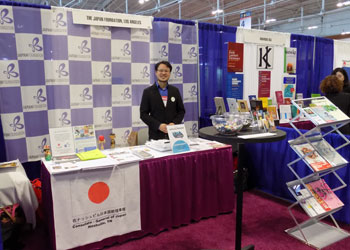

 Japanese Language Education Update 49:
Japanese Language Education Update 49:By Derek Chin, Japanese Language Program / Advocacy Coordinator
From November 17 – 19, The Japan Foundation, Los Angeles participated in the 2017 ACTFL (American Council on the Teaching of Foreign Languages) Convention, held in Nashville, Tennessee. We teamed up with the Japanese Consulate General in Nashville to put up a booth together and introduce educators and school administrators to useful information and resources for learning and teaching Japanese.
At our booth, we had about 200 teachers and administrators visit us; we were able to meet many Japanese teachers from all around the U.S., as well as other language educators such as Chinese and Spanish teachers who stopped by and were interested in either bringing some of our goodies to their Japanese colleagues at their schools, or strengthening their Japanese programs, or simply learning Japanese themselves. We presented all our visitors with “goody bags” that included many resources for teaching and learning Japanese that they could use in the classroom: vocab booklets, info on useful web apps, websites, and grants, cute badges and stickers, and much, much more.
We also teamed up with The Laurasian Institute and J-LEAP (Japanese Language Education Assistant Program) participants. During open exhibit hours, J-LEAP participants explained to visitors about their experiences with the J-LEAP program and how they can collaborate with Lead Teachers to provide a rich learning experience for students. If you are an educator, there is still time to apply! For more information on the J-LEAP program, see this link (https://www.jflalc.org/jle-j-leap).
Meanwhile, the various educational sessions that were held were extremely informative, with many of them addressing how to incorporate global competency and social issues into the language classroom, an ever-continuing and ever-important topic that we also highlighted in a previous education update article (https://www.jflalc.org/pub-breeze118). One group of presenters showed a real-life example of how these issues were incorporated into the novice classroom, proving this topic can be possible at almost any level. Their example showed a lesson discussing the diversification of the family in Japan, inspired by the movie “Haafu.” The students learning Japanese related their own diverse family backgrounds to the diversity in Japan; they made videos describing their own different backgrounds to students in Japan. Through these videos, they were able to raise awareness of such diversity, both among themselves and in Japan, and celebrate it as a shared commonality. Like this, it is so heartening to see many educators leading the way in equipping students with the skills to connect them with both their surrounding community and with Japan.
Indeed, one must keep in mind the bigger picture to prepare students (and our own selves) for global citizenship. How can we make meaningful, personal connections to the world around us? What can we share and learn about ourselves and others, and how can we encourage empathy? An enhanced and nuanced understanding of the world – both our own and those of others – and a way to make connections will be key for living and communicating in the 21st century.
The next ACTFL is scheduled to be held in New Orleans. We hope to see you there!